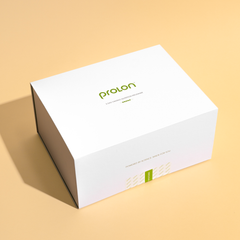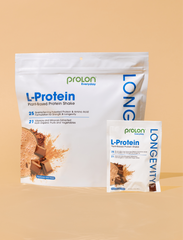
Cleanses and Detoxes: Which Ones to Consider, and What You Should Avoid
Key takeaways
- Most cleanses and detoxes are marketed to “remove toxins,” or help you lose weight, but have little to no scientific research to support them.
- Juice cleanses may help reduce weight and food cravings, but can also put your gut microbiome at risk, which may lead to metabolic dysfunction over time.
- There are several potential health risks associated with herbal or supplement detoxes, but very few proven benefits.
- Autophagy is the body’s natural cleanup system, which removes or recycles old and damaged cells to prioritize healthier ones.
- The Prolon 5-Day Fasting Mimicking Diet (FMD) may be a healthier, clinically backed alternative for supporting overall health, promoting fat-focused weight loss, and protecting lean muscle mass.
Your body is a sophisticated detoxification machine, constantly working to neutralize and eliminate harmful substances. Yet, the booming industry of detox programs and cleanses would have us believe we need external help to flush out toxins, and optimize our body’s own biological processes. If you’re invested in your health and longevity, it raises the critical question: are these detox cleanses actually safe and effective?
Many commercial body cleansing products claim to help you lose weight fast, eliminate toxins, flush heavy metals, reset digestion, boost energy, or “detox” the body for overall wellness. However, most of these products lack credible scientific research and offer little to no measurable proof of delivering real, lasting results. It can be difficult to know if cleanses live up to the hype, and if their purported benefits might also come with side effects.
Let’s dive into the science behind some of today’s more popular cleanse and detox options, and help you feel empowered to make the best decisions for your health.
What’s the difference between a cleanse and a detox?
Actually, not much! Cleanses and detoxes both claim to rid the body of harmful toxins, bacteria, or waste buildup; these may include things like environmental pollutants, unhealthy additives in processed foods, effects of everyday stress, and heavy metals present in our food and water supply. One main difference, however, is that cleanses may focus more on the digestive system, while a detox is often geared at a broader removal of perceived toxins. There are many different types of cleanses and detoxes too, with countless commercially-marketed versions sold over the counter in stores and online.
While some of these products may lead to some initial weight loss (mostly due to a lower caloric intake), it’s important to note that this weight is often regained once a person returns to their previous eating habits. It’s also worth noting that these methods of body cleansing, detoxification, and weight loss carry the potential for significant risks, and should be discussed with your healthcare provider before you consider trying one for yourself.
Here are some of the most common kinds of body cleanses and detoxes:
Juice cleanses
You may have seen them advertised at a local juice bar or smoothie shop, but do juice cleanses really work? Typically undertaken for a span of three, five, or even seven days, this type of cleanse allows for the consumption of juiced fruits and vegetables only.
Pros: There are some clinical studies that show a three-day juice cleanse may reduce body weight and maintain that loss with some success post-cleanse. However, this is likely due to consuming fewer calories overall, while also eliminating animal products, overly processed carbohydrates, and alcohol. Juice cleanses can also be an easy way to get all of the vitamins and minerals present in whole fruits and vegetables, which many people do not get enough of in their regular diets.
Cons: Juicing fruits and vegetables removes their fiber component; since fiber is integral for a balanced and healthy gut microbiome, even short-term juice cleanses have been shown to potentially reduce the integrity of the gut lining. Over time, an unbalanced, or dysbiotic, gut can negatively impact insulin, hormone, and glucose regulation. Some pre-packaged juice cleanses also use unpasteurized juices which may contain harmful bacteria that’s especially dangerous for those who are elderly, have weakened immune systems, or who may be pregnant.

Herbal or supplement-based detoxes
Usually sold as a boxed program that may last anywhere from one day to a few weeks, these can be tempting for their apparent simplicity; all you have to do is take some pills, or drink a few herbal teas a day, and go on eating a regular diet otherwise.
Pros: Some of the common ingredients found in herbal detoxes may have chelating properties (the ability to bind to metals in the body). However, research states that the perceived detoxification effects of these supplements are mostly exaggerated for marketing purposes. In fact, both the Federal Drug Administration (FDA) and Federal Trade Commission (FTC) have targeted certain companies for making false claims about their detox products or including ingredients that pose significant health risks.
Cons: Most supplement-based detoxes incorporate laxatives, which can promote water-based weight loss, potentially causing dehydration, disruption of gut flora and composition, and nutrient malabsorption. For those already taking prescription medications, the addition of certain supplements can also interfere with their effectiveness, causing serious side effects.
Colon cleanses
These body cleanses aim to flush the lower intestinal tract with fluid through the use of enemas, laxatives, or colonic irrigation (also known as colonics).
Pros: Sometimes used in hospitals to prep a patient for certain intestinal procedures; however, any alternative claims that this type of cleanse eliminates toxins or resets digestion are not based on clinical studies.
Cons: Very little scientific evidence exists to show that colon cleansing offers any real, substantial, or lasting health benefits at all, and harmful side effects like cramping, bloating, dehydration, electrolyte imbalances, intestinal tearing or bleeding, infection, and vomiting are all potential dangers. Those with a history of hemorrhoids, colon surgery, and gastrointestinal, heart, or kidney disease are also at greater risk of complications. In a few extreme cases, coffee enemas (where liquid coffee or coffee grounds are injected into the lower intestine) have even led to death, due to their potential for severe electrolyte abnormalities, inflammation of the colon, and sepsis.
Calorie-restricted diets
Calorie-restricted diets are usually undertaken for purposes of weight loss, longevity, and/or improved overall health. While there is no predetermined percentage of caloric reduction or length of time involved, many people need to reduce their daily caloric intake by anywhere from 10-25% for a period of a few months, or even years at a time to experience notable benefits.
Pros: The bulk of scientific studies show that calorie restriction diets can offer some health benefits like reduced disease risk and extended lifespan in animals. Human studies are still less robust, but in some cases, these diets may lead to reduced cravings for unhealthy foods, reduced risk markers for age-related diseases, and healthy weight loss, particularly in overweight individuals.
Cons: For any diet that limits the kind or amount of food you consume, it’s always recommended to consult with your healthcare provider beforehand. If not, a restricted diet can cause you to miss out on vital nutrients your body needs to function optimally. It can also lead to fluctuating blood sugar levels, which can be particularly concerning for those with prediabetes or diabetes. Calorie-restricted diets may also cause feelings of fatigue and hunger for some people, making it a difficult protocol for many to adhere to long-term.
Water fasting
During a water fast, you only consume water and no food or other liquids. This severe form of fasting is often done over the course of one to three or more days, and medical oversight is highly recommended.
Pros: There is little science to show that short-term water fasting on its own (less than 72 hours) results in notable health improvements. Some initial weight loss is common, but it’s mostly due to water loss, and is usually regained once the fast is over. Short-term water fasting may be used in conjunction with periodic or intermittent fasting protocols, both of which do offer clinically-backed benefits. Prolonged water fasting (more than 72 hours) has been linked to improved health outcomes, but should include medical oversight to be completed safely.
Cons: The negative side effects of water fasting can range from blood sugar fluctuations, headaches, and nausea to serious electrolyte imbalances, nutritional deficiencies, and dehydration (nearly 30% of the body’s hydration comes from food). Prolonged water fasting in particular can lead to refeeding syndrome complications as well, which include the added risk for cardiopulmonary and metabolic dysfunction due to reintroducing food too quickly after fasting.
How your body’s detox organs clean the body naturally
It’s an understandable urge to want to detoxify your body from time to time, and protect it from any environmental or daily lifestyle strains you may experience. However, your body’s natural detox organs are also hard at work with their own unique biological processes that are specifically designed to do just that. Your liver, kidneys, digestive and lymphatic systems, lungs, and skin are all laboring 24/7 to identify, neutralize, and eliminate harmful substances and waste from your body in the following ways:
- The liver filters toxins out of the blood, and converts them to waste that is then excreted.
- The kidneys clear out toxins, waste, excess water, and salt from the blood to convert into urine.
- Your digestive system comprises your mouth, esophagus, stomach, small intestine, large intestine, colon, and anus. Together, they break down the food you consume, absorb the nutrients you need, and eliminate the waste you don’t.
- The lungs filter the air you breathe, and expel carbon dioxide as a waste product.
- The skin sweats out toxins through perspiration.
- Your lymphatic system traps bacteria, damaged cells, and waste in lymph nodes where white immune cells can neutralize and release them into the bloodstream. From there, the kidneys excrete this waste as urine.
What is autophagy, and how does it promote cellular renewal?
Another way in which your body renews, or cleanses, itself naturally is through a biological process called autophagy. Simply put, autophagy is a kind of cellular cleanup mechanism that targets old and damaged cells throughout the body, then removes or recycles them to prioritize healthier ones. This natural method of cellular renewal generally kicks in after 72 hours of fasting, and is far more effective than any temporary detox or fad cleanse you might try, because it benefits the health of every organ and system in your body. Think of it as a foundational whole-body reset and a key component for disease prevention and longevity. By working in tandem with your detox organs to cleanse, renew, and rejuvenate at the cellular level, autophagy is also a proactive deep-cleansing process; by contrast, any short-term benefits of a typical detox or cleanse are usually superficial, and often not sustainable.
Prolon benefits your health and weight loss goals with autophagy
Autophagy is in fact one of the driving forces that make Prolon’s 5-Day Fasting Mimicking Diet (FMD) so effective. Specifically designed to activate autophagy, Prolon’s 5-Day FMD is backed by over 25 years of scientific research, and has demonstrated results that are far more profound than simply cleansing, detoxing, or flushing toxins. It allows the body just enough nutrients to sustain its necessary functions, while still keeping it within a fasting state to trigger all the natural benefits of autophagy. Clinical studies have linked the FMD to a range of health benefits, including the following:
- Sustained fat-focused weight loss with lean muscle protection
- Reduced waist circumference and BMI
- Enhanced skin appearance (after three monthly consecutive cycles)
- Lower biological age score (after three monthly consecutive cycles)
- Reduced cravings for sugar and less healthy foods
- Improved energy and focus levels after completion of the fast
As a healthier alternative to “cleanses” or “detoxes,” Prolon’s 5-Day FMD may be a much more powerful and efficient tool for supporting weight care, healthy aging, and overall wellness.
How you can support your body’s natural cleansing processes
One of the best ways to enhance your body’s natural detoxification efforts is by making healthier lifestyle choices today. Make an honest assessment of your everyday habits to see where you might make even one or two changes to start. Here are some effective tips to help you cleanse your body naturally, and improve overall health and longevity:
- Eat a balanced and nutrient-rich diet that prioritizes fresh vegetables, fruits, antioxidants, and whole grains, such as The Longevity Diet. Choosing quality, whole foods supports your gut microbiome, and gives your body the fuel it needs to perform well and cleanse naturally. Avoid overly-processed packaged foods that tend to contain more artificial preservatives, sugars, and other additives.
- Exercise regularly, even if it’s only several minutes of brisk walking a day. Physical movement improves digestion, and encourages sweating for added detox benefits.
- Practice good sleep hygiene to give your body the rest time it needs to reset and renew.
- Drink plenty of water, which not only keeps your cells hydrated to better transport and filter waste, but also improves skin appearance and energy levels.
- Prioritize stress management to reduce chronic inflammation, and enhance overall metabolic health.
- Cut back on alcohol, caffeine, and sugar consumption, as too much of these can overtax your organs, and disrupt their ability to function optimally over time.
- Limit exposure to toxic chemicals like harsh household cleaning products, tobacco smoke, and environmental pollution whenever possible. This will reduce the amount of work your natural detox organs need to do to keep you healthy.
- Explore Prolon’s 5-day FMD, which helps cleanse your body at the cellular level, and its other longevity products, which are scientifically developed to support healthy aging.
Every choice you make on behalf of your own health and wellness is important, and we’re always here to help along your journey. Reach out to our Prolon team anytime to find out if the 5-Day FMD might be right for your health goals.
FAQ:
Q: Do juice cleanses work?
There is some scientific evidence to show that a three-day juice cleanse may help reduce food cravings and promote sustained weight loss, but these results may be attributed more to a lower caloric intake, increased vitamins and minerals from fruits and vegetables, and the absence of animal products, alcohol, and simple carbohydrates.
Q: What’s the difference between a detox and a cleanse?
There is very little distinction between a detox and a cleanse. A cleanse tends to focus more on digestive issues, however, while a detox is marketed more for overall toxin-removal.
Q: Are detoxes safe?
Detoxes can be safe to do within reason, but it is always recommended to consult with a healthcare provider beforehand, since most carry the potential for side effects and health risks.
Q: How do I know if I need to detox?
There is no scientific evidence that detoxes are ever a “necessary” undertaking. However, if you are feeling rundown, sluggish, or experiencing digestion upset on a regular basis, you may want to consult your healthcare provider for further guidance.
Q: How is Prolon different from a juice cleanse?
The Prolon 5-Day Fasting Mimicking Diet (FMD) mimics the effects of fasting and triggers the body’s natural cellular cleanup process, autophagy, is backed by over 25 years of clinical studies, and is the first and only patented nutrition program to support longevity through cellular rejuvenation. A juice cleanse is a form of body cleansing where you only consume juiced fruits and vegetables for a period of one or more days. A 3-day juice cleanse may offer some health benefits, but also has the potential to disrupt the gut microbiome, and should be approached with caution.
Q: Can I detox my liver?
The liver is one of the body’s natural detox organs, and the best way to support it daily is with healthy lifestyle choices. Most over-the-counter “liver detox” products have no scientific evidence to support their effectiveness, and many also carry the potential for serious health risks. If you think you might be struggling with a more serious liver condition, it’s important to consult with a healthcare provider and address it right away.
Q: Is water fasting safe?
Short-term water fasting (less than 72 hours) may be considered safe, but should still be discussed with a healthcare provider first. Water fasting, particularly prolonged water fasting (more than 72 hours) can lead to serious health concerns like electrolyte imbalances, dehydration, malnutrition, headaches, nausea, low energy, muscle loss, and refeeding syndrome complications like severe cardiopulmonary and metabolic disruptions.
National Library of Medicine. National Center For Biotechnology Information. “Detox diets for toxin elimination and weight management: A critical review of the evidence.”
National Library of Medicine. National Center For Biotechnology Information. “Effects of Vegetable and Fruit Juicing on Gut and Oral Microbiome Composition.”
National Library of Medicine. National Center For Biotechnology Information. “Extended Calorie Restriction Suppresses Overall and Specific Food Cravings: A Systematic Review and a Meta-analysis.”
National Library of Medicine. National Center For Biotechnology Information. “Fasting-mimicking diet and markers/risk factors for aging, diabetes, cancer, and cardiovascular disease.”
National Library of Medicine. National Center For Biotechnology Information. “Health benefit of vegetable/fruit juice-based diet: Role of microbiome.”
National Library of Medicine. National Center For Biotechnology Information. “Proctocolitis From Coffee Enema.”
National Library of Medicine. National Center For Biotechnology Information. “The association of weight loss with changes in the gut microbiota diversity, composition, and intestinal permeability: a systematic review and meta-analysis.”
Nature Communications. “Fasting-mimicking diet causes hepatic and blood markers changes indicating reduced biological age and disease risk.”













